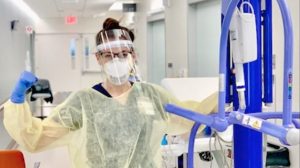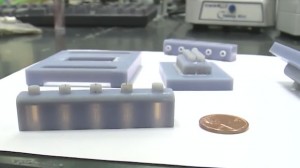NEW YORK (Reuters Health) – After ruling out an upper gastrointestinal (GI) source of bleeding, patients with serious hematochezia should undergo colonoscopy within the next few days. But in general, there’s no need to rush it, according to physicians at the University of Southern California, Los Angeles.
In their prospective study, Drs. Loren Laine and Abbid Shah found that urgent colonoscopy was no better than routine colonoscopy in preventing further bleeding, cutting down on transfusions, or reducing hospital length of stay or costs. They did see benefit for urgent upper endoscopy.
As they point out in the American Journal of Gastroenterology published online July 20th, guidelines from the American Society for Gastrointestinal Endoscopy recommend colonoscopy “in the early evaluation” of severe acute hematochezia, but they don’t define “early.”
The doctors theorized that in this situation, urgent colonoscopy would improve clinical results. They therefore looked at outcomes for 85 patients who presented with hematochezia and another high-risk feature, such as heart rate over 100 beats/min, systolic blood pressure < 100 mm Hg, need for blood transfusion, or a drop in hemoglobin within 6 hours of 1.5 g/dL or more.
Upper endoscopy performed within 6 hours of presentation showed that 13 patients (15%) were bleeding from the upper GI tract. The authors randomly assigned 36 of the remaining 72 to urgent colonoscopy (within 12 hours after presentation) and 36 to colonoscopy within 36-60 hours, both preceded by gastric lavage.
Further bleeding occurred in 22% of patients in the urgent group and 14% in the nonurgent group, a nonsignificant difference.
Other outcomes were also similar: length of stay, 5.2 days in the urgent group and 4.8 days in the nonurgent group; hospital charges, $27,590 vs 26,633, respectively; need for another intervention to diagnose or treat bleeding, 36% vs 33%, respectively.
Slightly more blood was transfused after randomization in the urgent group: 1.5 vs 0.7 units (p = 0.044).
The most common sources of bleeding diagnosed on the initial colonoscopy were diverticula and internal hemorrhoids. Other diagnoses were colon cancer, colonic ulcers, colitis, vascular ectasias, rectal varices, and portal hypertensive colopathy.
Colonoscopy was nondiagnostic in 22% in the urgent group and 33% in the elective group.
Thus, Drs. Laine and Shah conclude, urgent colonoscopy in patients hospitalized with serious lower GI bleeding did not improve outcomes or lower costs.
They note, however, that early colonoscopy may be warranted for patients with an identified definite site of active bleeding or stigmata of recent hemorrhage. And patients who continue to bleed may require urgent intervention such as angiography or repeat colonoscopy.
They also recommend an upper endoscopy before colonoscopy, whether or not the nasogastric aspirate shows evidence of blood or bile.
The authors note that they did not accrue their prespecified sample size of 134 patients in each group, because of a change in hospital protocol.
Reference:
Randomized Trial of Urgent vs. Elective Colonoscopy in Patients Hospitalized With Lower GI Bleeding
Am J Gastroenterol 2010.




